Why buy an apartment or a house and renovate it?

Buying a property to renovate is a unique adventure, full of challenges and opportunities. Whether you're dreaming of a city-center apartment or a charming country house to transform, purchasing a property in need of renovation is an opportunity to create a home that truly reflects who you are – and to make a smart investment. Buying a fixer-upper can help negotiate a lower purchase price, access attractive financial incentives or aid, and eventually, achieve strong added value for resale. But make no mistake: turning this dream into reality requires good preparation. In this article, we’ll walk you through everything you need to know before the first step in your renovation-ready property journey.
The benefits of buying a property that needs renovations
Buying an apartment or a house and carrying out renovation works offers several benefits, as it allows you to:
- take advantage of a good location,
- negotiate down the selling price,
- arrange the interior of the property as you see fit,
- to increase the real estate value of the property for a strong resale.
Take advantage of a good location
If you're targeting a prime location in the city center or looking for a high-yield rental investment, buying a property that needs renovation can be a smart choice. Newer developments, often located on the outskirts, simply can’t compete with the charm and convenience of an ideally located, older property.
Location becomes even more crucial if you’re buying to rent. Older properties typically offer excellent access to public transport, shops, and everyday amenities, all key features for attracting tenants. Whether you’re trying to appeal to young professionals or seniors who prefer to avoid using a car, a renovated home in a central neighbourhood is far more desirable.
Benefit from a lower selling price
Because of the renovations required, older properties are often listed at more affordable prices than new builds or recently renovated homes. This price difference can represent significant savings, around 10 to 20 % less, or even more if major renovations are needed.
Notary fees for an older property are higher than for a new one – typically around 7 to 8 %, compared to 2 to 3 % for new builds. That said, renovation costs are not included in the calculation of notary fees, which can represent a significant saving in the overall cost of your real estate project.
Arrange the interior according to your tastes
Buying a property to renovate gives you the freedom to transform the space and create a home that truly reflects your style. You can design each room according to your personal tastes and break away from the overused layouts you see everywhere. You’ll get a home that feels like you, a cozy retreat after a long day, or a space you’re proud to share with friends and family.

The goal of any renovation project is to unlock the full potential of the property, striking the right balance between originality and practicality.
If you’re short on ideas or need some guidance, Maison Kyka is here to help. Our interior design studio will work with you to create a unique space that truly reflects your style, with that special touch that makes all the difference.
Increase the real estate value of the property
Renovating a property increases its appeal, and therefore its value. Unlike new builds, an old home that requires work has strong potential for capital gain once the renovations are complete. If you ever decide to sell, the property may be worth significantly more then.
For instance, upgrading the energy efficiency of the home – which means improving its energy performance diagnosis, known in France as the DPE) – is especially worthwhile, as it can have a major impact on market value.
If you’re considering a rental investment, buying a property to renovate can also help you avoid some of the limitations of the new-build rental market, such as rent caps.
With an older property, you often have more flexibility when setting the rent, except in some regulated areas like Paris, Lyon, or Marseille.
Even with these restrictions, a well-renovated property tends to be more attractive and profitable over the long term.
With Maison Kyka, you’re supported by real estate professionals at every stage of your investment project:
- Real estate hunt: our project managers help you find and negotiate the selling price of your dream property,
- Architectural design: our interior design studio helps you determine the most interesting work to do,
- Carrying out the work: one of our project managers manages and monitors the renovations,
- Layout: we help you identify and install the most suitable furniture for your space,
- Resale: if you ever decide to resell your property, we are in the best position to help you maximise your added value. Photos, listings, home tours: Maison Kyka takes care of everything.
"I had a fantastic experience with the Maison Kyka team. My dedicated architect fully understood my expectations and the project team was very attentive. My project was delivered on time and the end result is fantastic. I am very satisfied with the service received."
Lyrod Levy
What you need to know before buying a property that needs renovations
Properties that require renovations are attracting more and more buyers. However, if the renovation is poorly planned, the whole project can become a major source of stress, with financial and technical challenges. Here are three things you need to know before buying an apartment or a house:
- Familiarize yourself with real estate diagnostics,
- Inspect the property and plan the required works,
- Invest in high quality materials and equipment.
Learn more about real estate diagnoses
Assessing any property involves careful analysis of real estate diagnostics, which provide valuable information on its general condition. These diagnoses make it possible to anticipate the type and extent of renovation works required.
Here are the most common real estate diagnostics, depending on the type of property:
- Energy performance diagnosis (DPE): it is mandatory for all homes, as it assesses the insulation of the property as well as its energy consumption.
- Carrez law diagnosis: it measures the exact area of the apartment, discounting non-living areas such as those where the ceiling height is lower than 180 cm.
- State of risks and pollution: it is required to provide information on the natural, technological or pollution risks to which the property could be exposed.
- Termite diagnosis: it is required in risk areas, valid for six months and is used to detect the presence of xylophagous insects.
- Asbestos diagnosis: it is mandatory for buildings built before July 1997, as it provides key information on the presence of this dangerous material.
- Lead diagnosis: it is relevant to buildings constructed before 1949, as it detects the presence of lead in paints.
- Electricity and gas diagnosis: it is mandatory for electrical and gas installations over 15 years old, resulting in a certificate that is valid for three years.
- Sanitation diagnosis: it is required if the property has a non-collective sanitation system.
Inspect the property and plan the required works
During the property tour, it’s essential to thoroughly inspect every aspect of the home, from the basement to the roof. No detail should be overlooked: check the condition of the walls, insulation, windows and doors, even the electrical and plumbing systems. Knowing the right questions to ask during a visit can help you avoid costly surprises later on.
To make this process easier, consider preparing a checklist of what to look for in the apartment or house. And don’t hesitate to take photos during the viewing!
It’s highly recommended to bring someone with you, especially if renovations are needed. When you sign a property search agreement, you benefit from a professional’s technical insight and experience. At Maison Kyka, our property hunters are trained by an interior architect, so they can spot what’s worth improving (or not), and they can estimate the renovation budget during a viewing.
Finally, keep in mind that depending on their complexity, renovation works can take several months to complete. This timeline should be factored in whether you plan to buy the property as your main residence or as a rental investment. And don’t forget to include a buffer in your budget to cover unexpected expenses, which are almost unavoidable in renovation projects.
Invest in quality
It can be tempting to cut costs by relying on cheaper materials or equipment. However, opting for quality materials is often more profitable in the long run.
Indeed, low-end materials can lead to recurring problems and even damages, which will cost you much more to repair. By choosing durable and efficient materials, you reduce the risk of damages that can affect the aesthetics and value of the property.
To make the home both comfortable and sustainable, it is better to invest in materials, equipment and manpower with a good quality to price ratio, or even go for high-end solutions.
If you do not have any experience in renovation or don’t feel qualified to oversee the works yourself, it is recommended that you call upon a renovation company or qualified craftsmen. Of course, this comes at an additional cost, but it ensures you that the work will comply with current standards and that you will benefit from solid assurances, in particular thanks to craftsmen’s ten-year guarantee, which covers possible construction defects.
To learn more about our bespoke support, book an appointment with one of Maison Kyka’s project managers.
"I have recently purchased my second property and Maison Kyka took care of everything from A to Z. From the property search to the renovation works, my dedicated architect was able to meet my expectations even better than I imagined! Thanks again, I highly recommend their services!"
Adrien Balikdjian
Existing aid to finance renovation works
There are several types of financial solutions to cut down the investment required to buy an apartment or a house in need of renovations, including:
- The interest free loan for first-time buyers,
- The interest free eco-loan,
- The regulated mortgage loan,
- The MaPrime Rénov’ subsidy,
- Energy saving certificates,
- The Plan Epargne Logement (home ownership savings scheme),
- Tax credits thanks to what is called a “déficit foncier” (real estate deficit),
- Exemption from property tax.
The interest free loan for first-time buyers
The interest free loan for first-time buyers (Prêt à Taux Zéro or PTZ in French) is a government-backed scheme designed to help low- to moderate-income households purchase their first home. This loan allows buyers to finance up to 40% of the purchase and the works, with no interest to be repaid, provided that the cost of renovations represents at least 25 % of the total purchase price.
This loan covers a wide range of renovation works, such as:
- thermal and sound insulation,
- energy renovation,
- space planning,
- improving accessibility.
It is the perfect aid to transform an old property into a modern home, while minimising the project’s financial impact. The loan is repayable over a period of up to 25 years, and can be combined with other loans.

The interest free eco-loan
Unlike the interest free loan for first-time buyers, the interest free eco-loan (eco-PTZ in French) is open to more buyers, including owner-occupants as well as landlords.
This loan aims to finance energy renovation works in main residences: eligible upgrades include the insulation of the roof or exterior walls, and the replacement of windows or the heating system.
The budget allocated can vary from €10,000 to €30,000, depending on the extent of the works, with a repayment term of up to 15 years. To qualify for this loan, buyers must call upon RGE (Recognised guarantor of the environment) certified businesses for the works.
The regulated mortgage loan
The regulated mortgage loan is another interesting financing solution for buyers who target properties that need renovation works. It covers up to 100% of the cost of the operation, including the works, with repayment terms ranging from 5 to 35 years. No income criteria are required, meaning this option is truly open to everyone.
Many types of renovation works are eligible for a regulated mortgage loan, including energy improvement, interior design, and even house extension.
This loan can also be combined with other financial solutions such as the PTZ or eco-PTZ. Its strength lies in its flexibility and the absence of restrictions on household income; but be careful to compare bank offers before making a commitment.
The MaPrime Rénov’ subsidy
Since 2021, the energy transition tax credit (crédit d'impôt pour la transition énergétique or CITE in French) has been replaced by the MaPrime Rénov’ subsidy, which helps owners – whether they are occupants or landlords – in carrying out of energy renovation works. It can be used to finance insulation or ventilation upgrades, and even the replacement of outdated boilers.
Its amount is calculated based on the applicant’s income and the expected gain in energy efficiency. This subsidy helps make the most expensive renovation projects more accessible. However, it is important to remain within certain spending limits to maximise its impact.
Energy Saving Certificates (CEE): help of energy suppliers
The Energy saving certificates (Certificats d'Économies d'Énergie or CEE in French), commonly known as “energy bonuses”, are a system set up by the State to encourage energy suppliers to help their customers save energy. This incentive can take various forms: from a simple bonus to concrete support in carrying out an energy performance diagnosis, including loans at subsidised rates.
Nearly 200 types of renovation works are eligible, ranging from wall and roof insulation to the installation of more efficient heating systems. To qualify for these subsidies, one must call upon RGE certified businesses and the property must be older than two years.
The Plan Epargne Logement (home ownership savings scheme)
If you have a Plan Epargne Logement (home ownership savings scheme) or a Compte Épargne Logement (home purchase savings account), you can take out a loan to finance buying and renovating a main residence. This loan can reach up to €92,000, with repayment terms extending from 2 to 15 years.
It is a great option for those who have diligently saved up and want to invest in improving or expanding their home.
Rental investment: receive tax credits for some types of renovation works
If you buy a property that requires renovations in order to rent it, it’s important to note that it is possible to deduct some of the works expenses from your taxes thanks to the “déficit foncier” (real estate deficit) scheme. In concrete terms, the costs incurred to renovate or upgrade a rental property can be deducted from your real estate income and thus reduce the taxable amount.
The works in question are those aimed at maintaining the property in good condition, without altering its layout or structure. These include renovating the roof, replacing the heating system or repairing electrical installations, for instance.
Exemption from property tax
Finally, some towns offer a temporary exemption from property tax for owners carrying out energy renovation works. Depending on the local authorities, this exemption can be total (100%) or partial (50%) over a period of five years.
To qualify, the total amount of the work must exceed €10,000, and one must register an official application with the tax office. Once the five years have elapsed, a new application can only be made after a period of 10 years.
Examples of homes renovated by Maison Kyka
Stéphanie and Julien's 200 sqm apartment in La Muette
In Paris, in the La Muette district, Stéphanie and Julien purchased a typical Haussmannian style apartment of 200 sqm. Originally designed with rooms in a row, this project required a real overhaul in order to adapt to the modern lifestyle.
The authenticity of classical elements, such as moldings and fireplaces, has been enhanced by contemporary touches, offering a perfect symbiosis between past and present. Each piece exudes elegance while integrating practical solutions for everyday life.
Marie-Laure and Léo's 31 sqm apartment in la Folie-Méricourt
In this historic apartment, we removed the suspended ceiling to unveil the original timber beams, and reimagined the living area as an optimized layout where an open kitchen flows seamlessly into an inviting lounge.
The entire space was reimagined around a vision blending industrial character with vibrant pop accents.
At Maison Kyka, we guide you through every stage of purchasing and renovating your property. Our philosophy lies in offering a personalized service and a distinctive eye for design, ensuring your future home is as unique as you are.



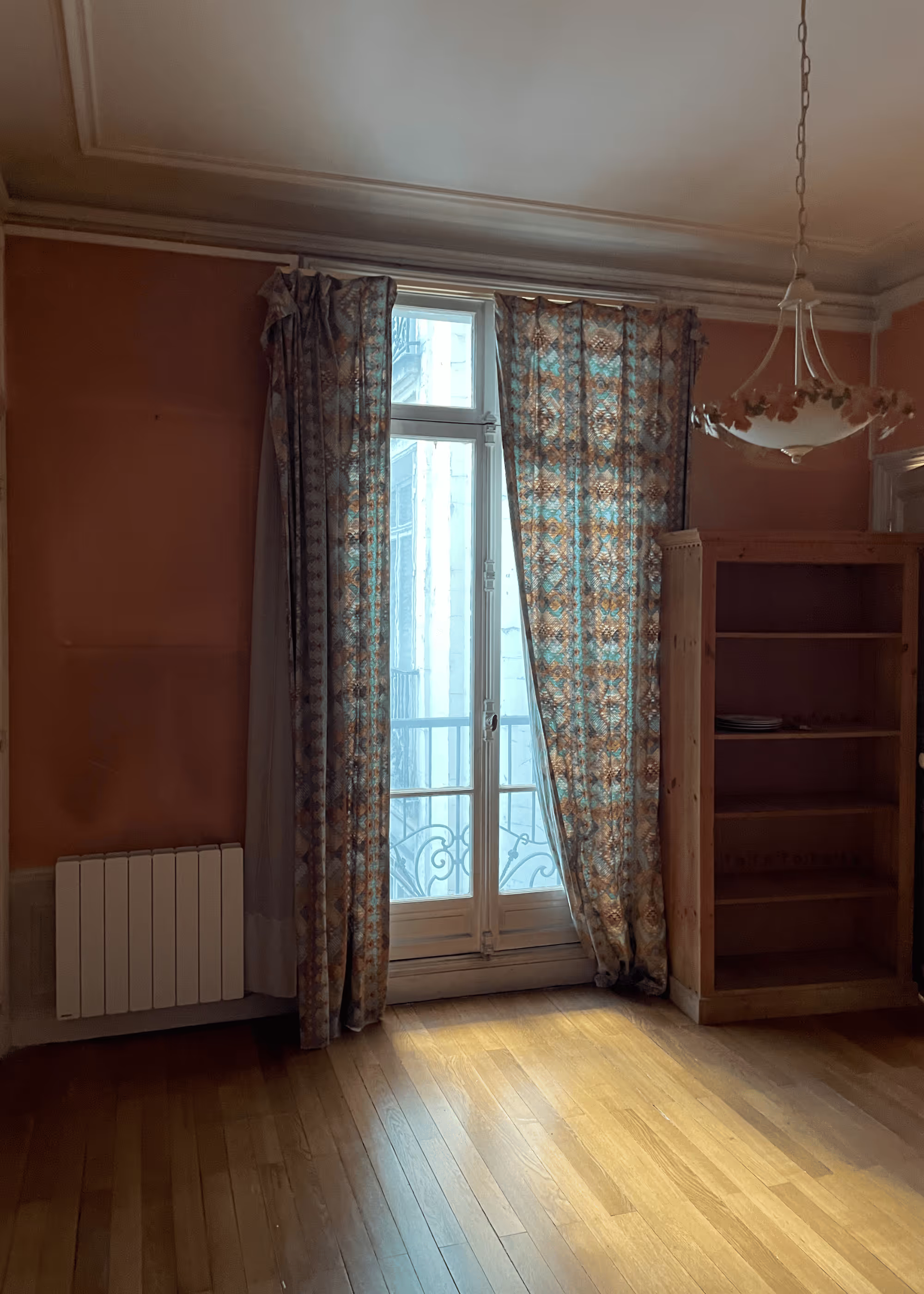
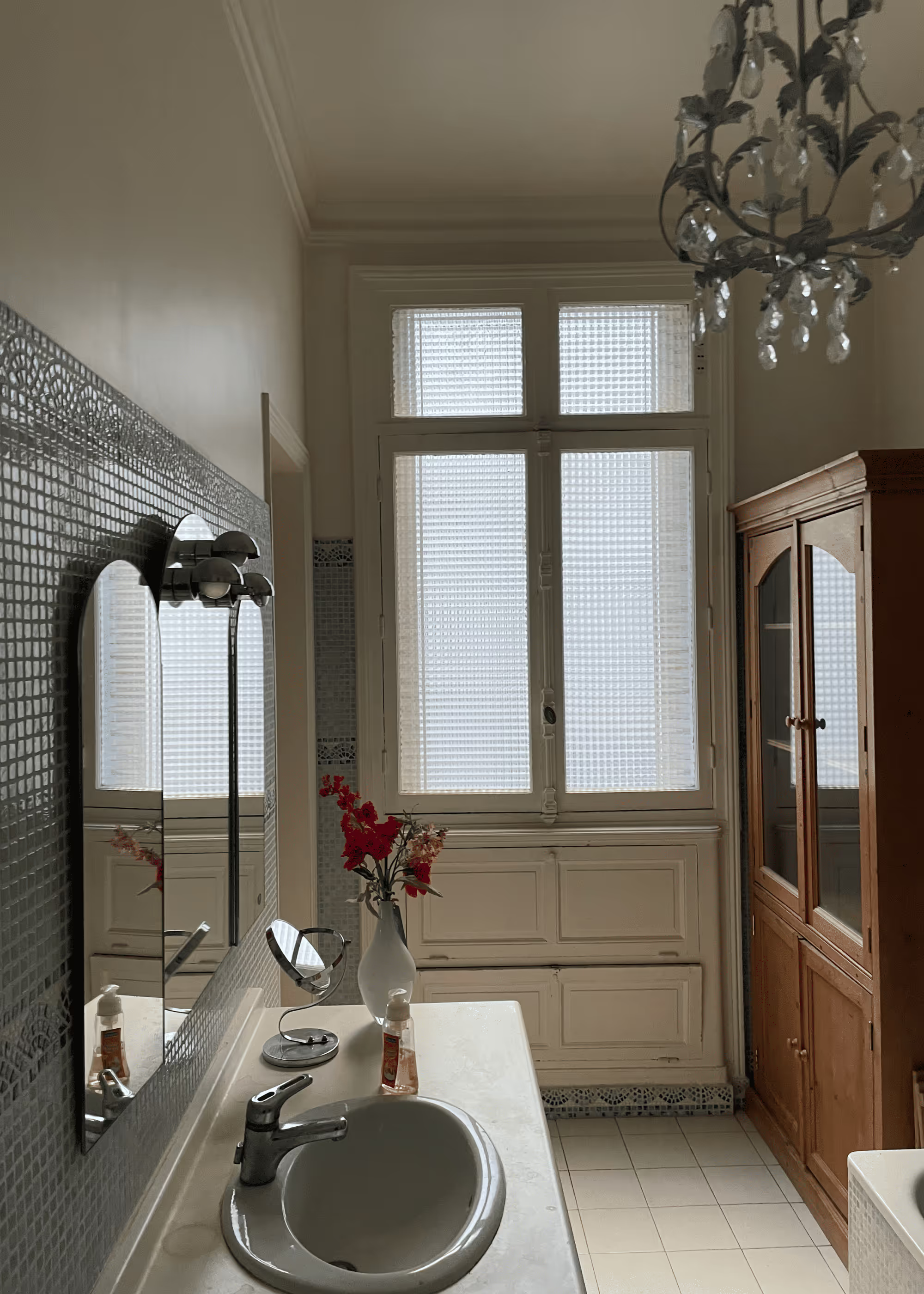
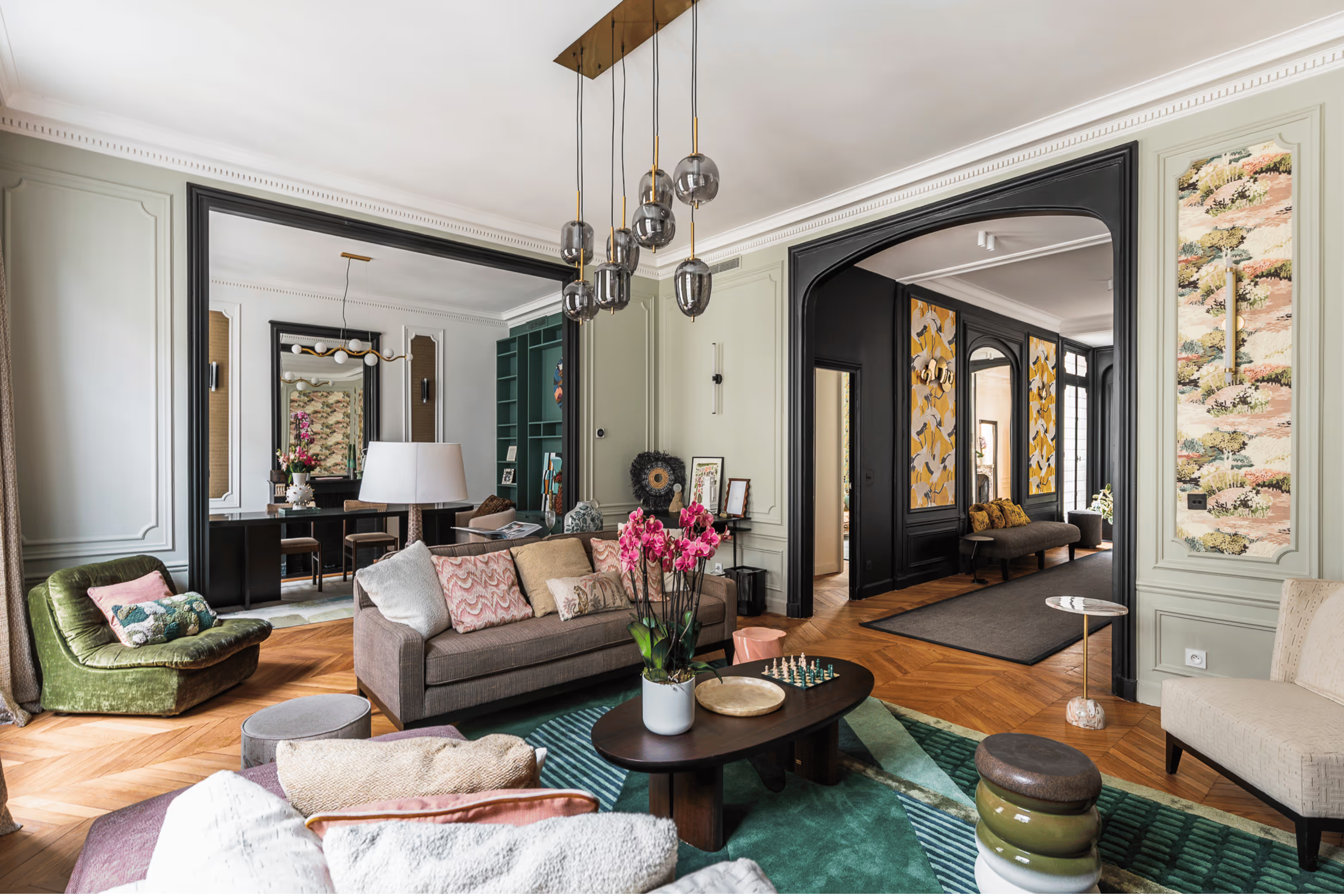
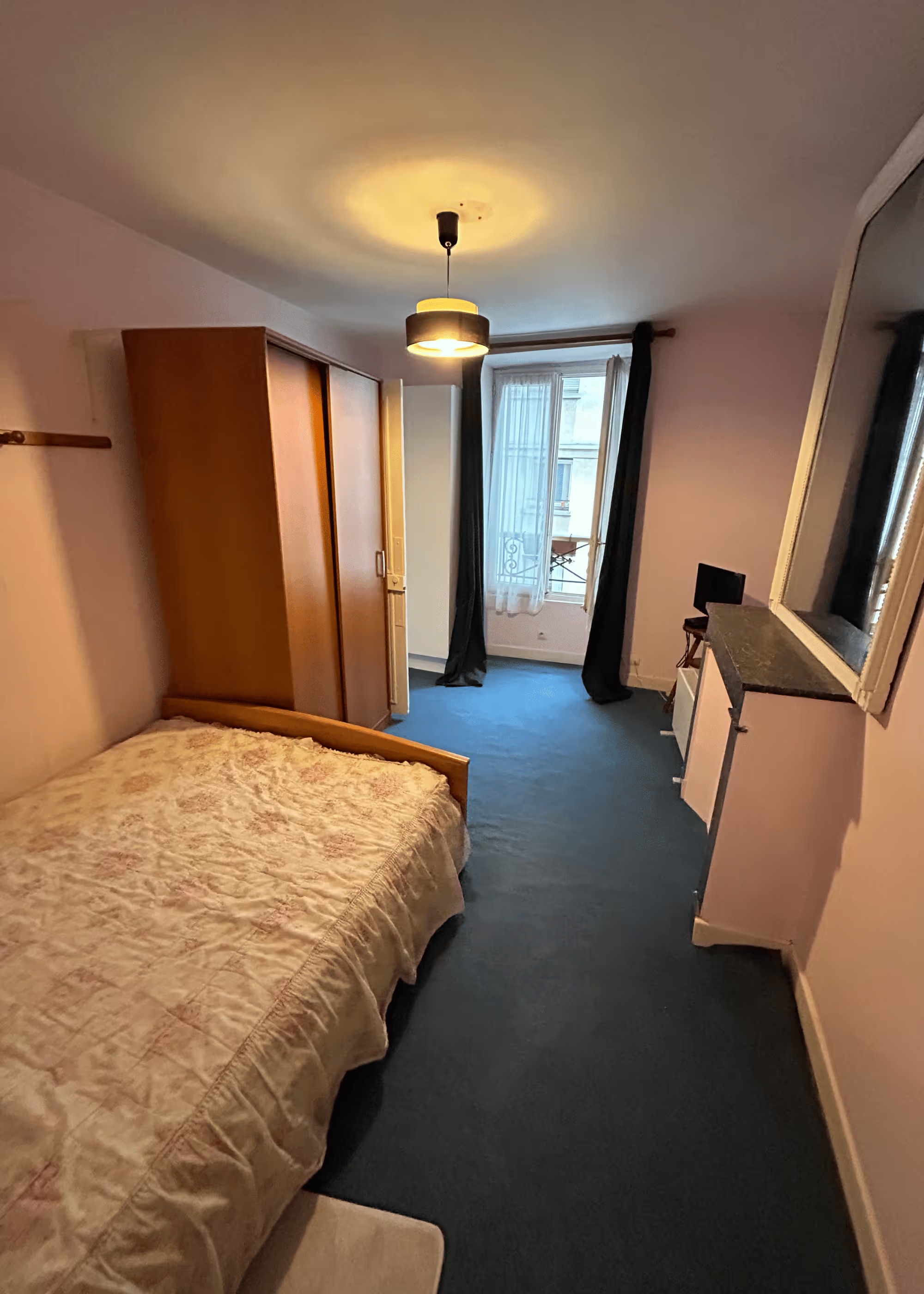
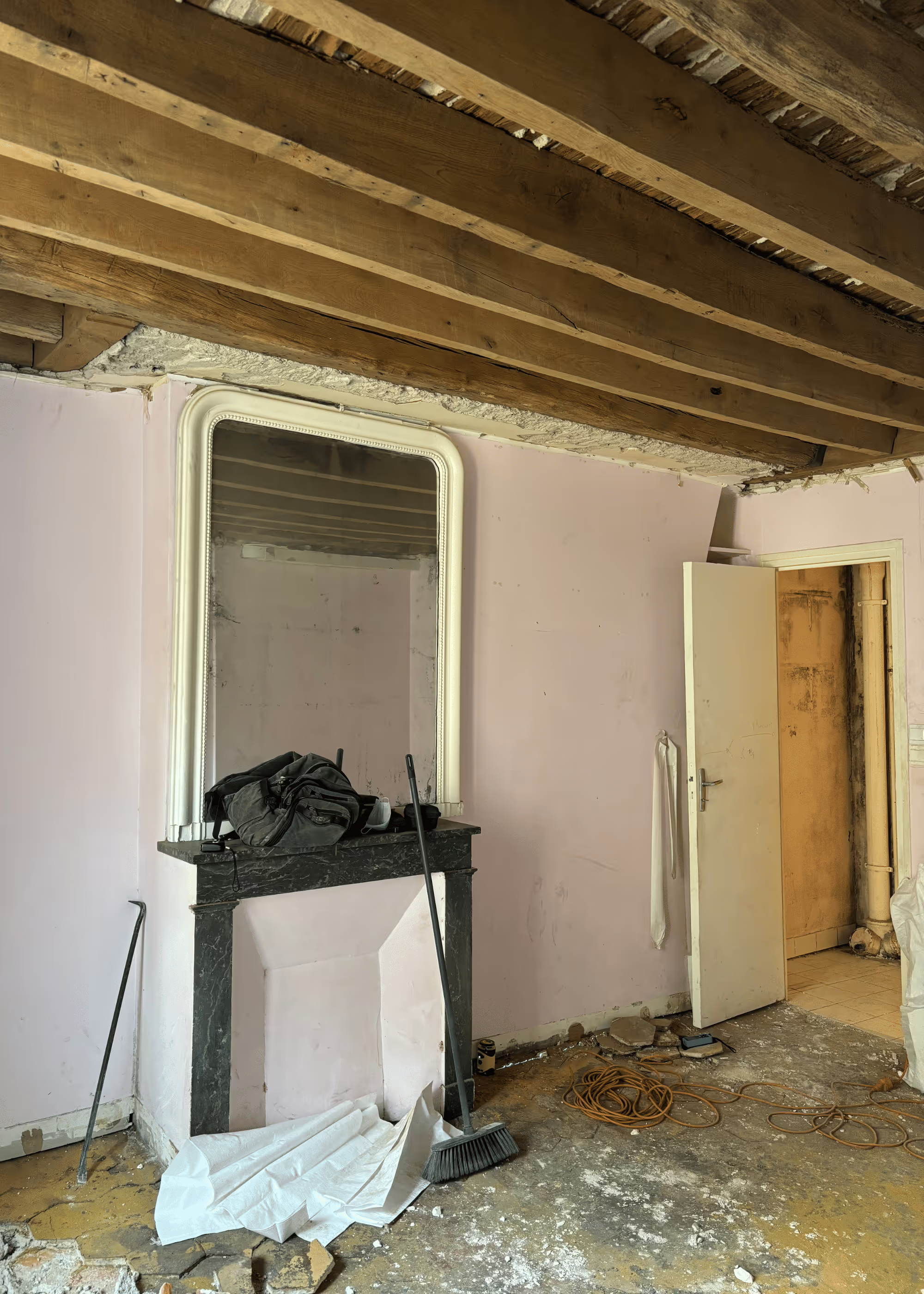
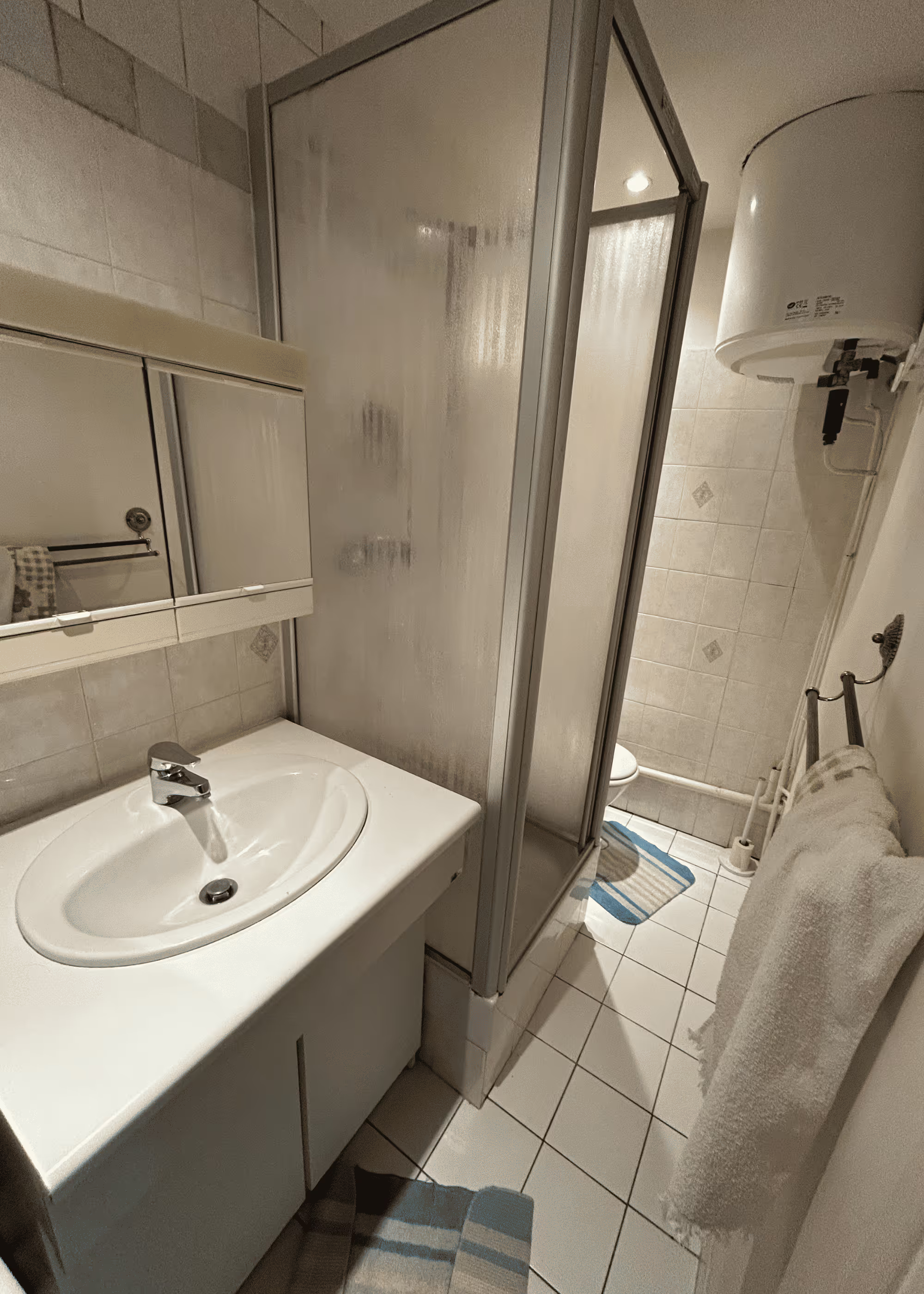
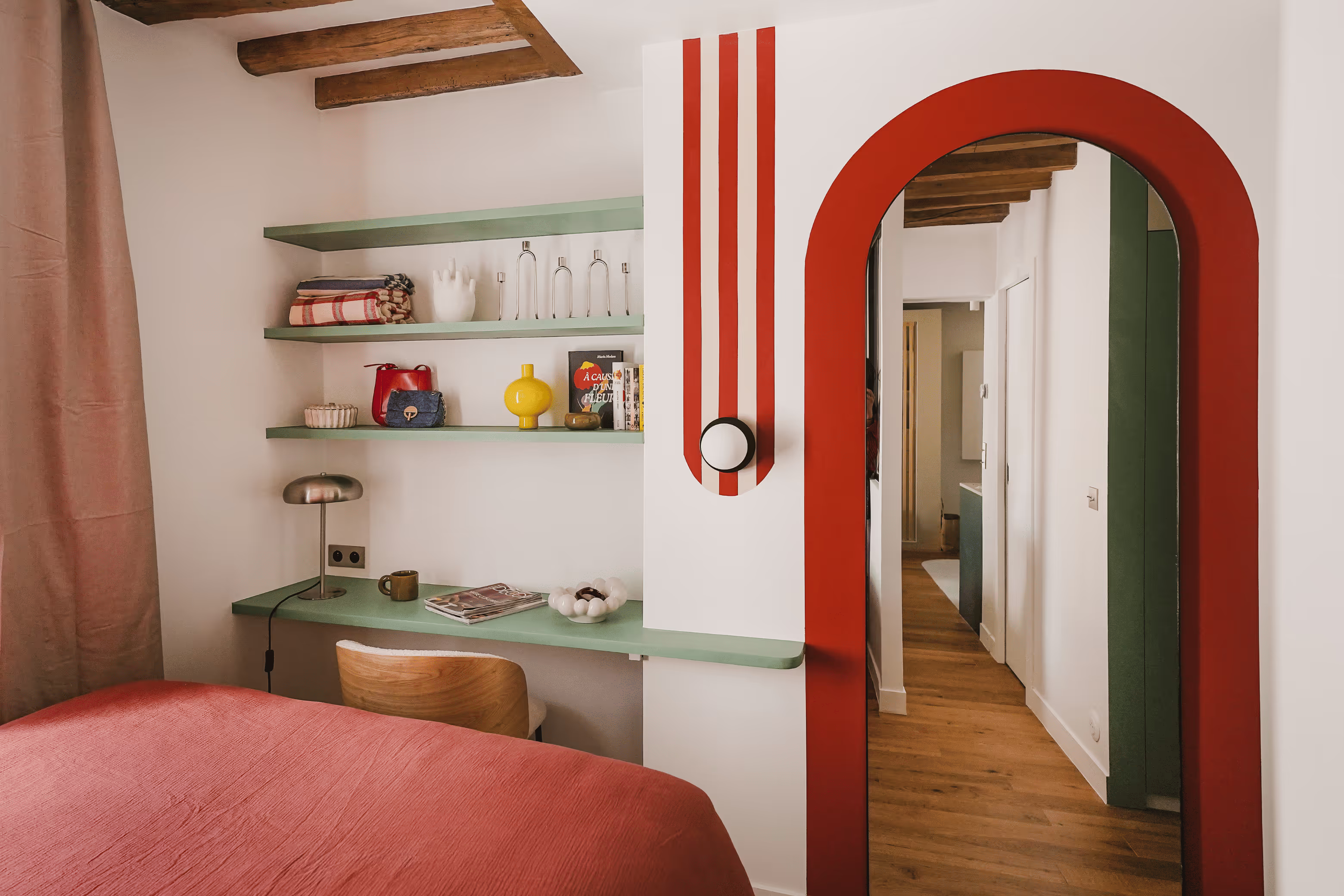




.webp)